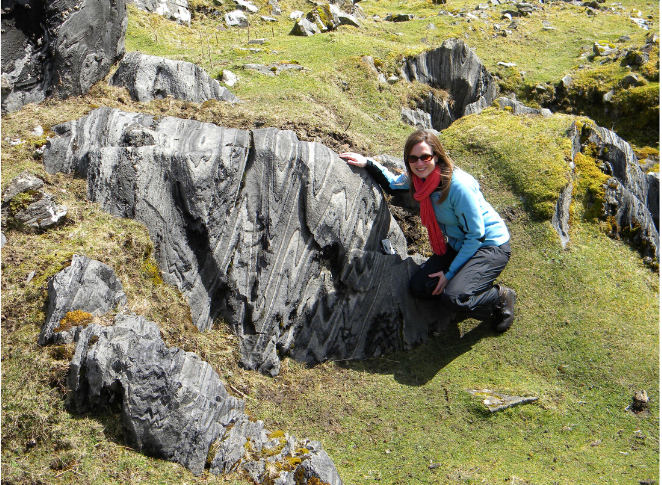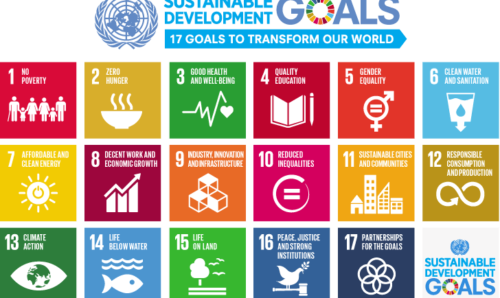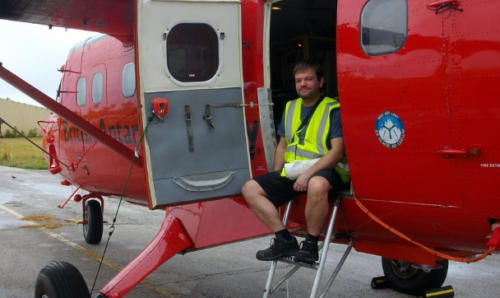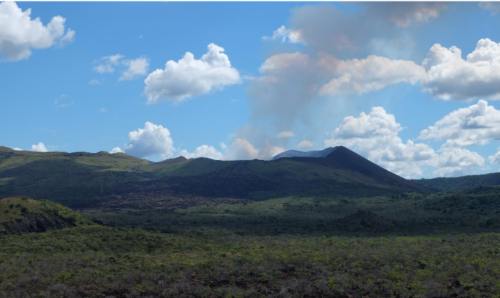In conversation with Dr Patricia Clay: UK Research and Innovation Future Leaders Fellow
Meet the Department 13th July 2020
Dr Patricia Clay is a UK Research and Innovation Future Leaders Fellow with the Department of Earth and Environmental Sciences. Patricia is an earth and planetary scientist and her research uses the noble gas and halogen elements to understand the chemical evolution of planets. In this interview, she tells us more about her role in the Department and her research.

How would you describe your research for the layman?
Volatile elements (like hydrogen, carbon, and the halogens) are important to many of the processes that have shaped our planet over time. The exchange of volatiles between the Earth’s surface and its interior influences melting, degassing, and how the atmosphere has evolved over time, for example. These elements are also essential for life and so understanding their origin and distribution within our planet can help us to better understand how, where and when early life likely developed on Earth. My current research is focused on measuring the halogens (Cl, Br and I) and the noble gases, a group of inert ‘geochemical tracers’, in meteorites and ancient rocks on Earth. By understanding the distribution of volatile elements like the halogens on Earth, we can hopefully learn more about the sorts of environments that were capable of hosting life on early Earth.
How does working in Manchester benefit your research?
Manchester is the only university in the UK that is focused on developing the technique that I use for measuring the halogens in the extraterrestrial, terrestrial and experimental samples that are central to my research. It is a technique called ‘neutron irradiation noble gas mass spectrometry’, or NI-NGMS for short, and Manchester is the ideal place to pursue my research for this reason. In addition to the unique laboratory facilities, there is wealth of different experiences and diversity in research areas within the Department of Earth & Environmental Sciences, which will be very beneficial. Working with people in different research groups and those with different technical skill sets to mine is very important to me and to my continued development as a scientist. Working in a collaborative environment is particularly beneficial to me at this early stage of my fellowship and career.
Who or what first inspired your interest in science and engineering?
My favourite book growing up was a story called The Twenty-One Balloons by William Pène du Bois. It is an adventure about a Professor whose balloon-ride around the world goes wrong, leaving him stranded on the Krakatau volcano, which in this story sits atop a huge diamond mine. Eventually the volcano erupts, sending him back home in his balloon with his diamond riches. For me, the story inspired an interest in volcanoes and rocks early on, and as a child I was always cracking rocks open with a hammer to see if I could find any diamonds inside. Sadly, I later learned it doesn’t really work that way! Interestingly, my uncle is also a geologist, but I didn’t really appreciate that he did research in isotope geochemistry until I was at university and spied that he had co-authored a paper with my undergraduate advisor. Geology sometimes feels like a small world!
Describe your role in the Department – what is a UKRI Fellowship?
I started my UK Research and Innovation Future Leaders Fellowship in March 2020. I was awarded this fellowship in the second round of funding, along with about 80 other fellows around the country working across hugely diverse research areas. The FLF is designed to provide four years of support for research, with the potential to add a further three years, so that I can focus intensively on pursuing my research goals. The FLF doesn’t place any constraints on research discipline, so it suits my needs very well because I am addressing problems that span the traditional boundaries of Earth and Planetary science. At the moment my main role in the Department is focused on research, further developing the techniques that I’m using, and developing my research group and network of collaborators. I will also support postgraduate students who are working in the noble gas laboratory where my research is based and I am keen to get involved in more teaching activities as my fellowship progresses.
What are you proudest of in your career to date?
Seeing the achievements of the students that I have worked with or helped along the way is a really great feeling and I am very proud to have been involved in their development. From submitting their thesis or first paper, to finding a fulfilling job that brings them happiness, it’s really great to see.
What are your hobbies or interests outside of work?
I love working with fabric and textiles and I’m very keen on reusing old fabrics and repurposing them into something useful and beautiful. I sew, quilt, knit, and crochet. Quilting is a huge stress relief for me – I find the repetitive measuring and cutting to be very therapeutic. I often integrate my passion for science into what I create so I end up with a lot of science-themed products. I am also a keen cake baker, a super competitive board gamer, and I love to read.
What advice would you give to your younger self?
Have patience. Look out for those around you. Don’t be shy about putting yourself forward for opportunities when they arise. Don’t take criticism personally. Be persistent. Find research questions that excite you and people that you enjoy working with – and try not to worry too much about the rest.
Where did you attend university and what did you study? What A levels did you study?
I spent four years at the Geology Dept. at Syracuse University in New York for my undergraduate degree. It was a hugely supportive and fantastic place to study, assuming you don’t mind snow! I was lucky enough to get a job working in the department’s Geology Library so I was always in the right place to chat with people, peruse books and journals, and I always had a quiet place to study. After my B.S. degree, I spent two years at Boston University pursuing a Master’s degree in Earth Sciences. I had a super enthusiastic advisor who encouraged me to do everything from field work to lab work to experimental petrology, where I got to design high pressure and high temperature experiments to simulate conditions within the Earth. That’s where I realized my passion was noble gas geochemistry. After my MA degree I moved to the UK to pursue my PhD at the Open University, where I was again lucky to be part of a welcoming and dynamic group. I’ve been in the UK ever since. We don’t have A-levels in the US but I enjoyed art, science and mathematics courses in high school.
Do you have a favourite film/book/band/sport/TV show?
Peppa Pig. Just kidding, but it feels like it sometimes! I love comedies like Father Ted and Black Books, but I especially love the early BBC nature programs, Life on Earth and The Living Planet. It’s hard to beat David Attenborough filming the Aldabran giant tortoise and the coco de mer palms in the Seychelles. Filming technology has come a long way since then but the classic nature programmes are still my favourite.
How are you managing research during the current period of lockdown?
I have two children at very different stages of development (7 months and 5 years old) so my family is taking it one day at a time at the moment. My research is heavily lab-based but I’m trying to take a flexible approach to each day and work on tasks that I can make progress on without access to labs. This way I feel like I’m moving forward each day. Ultimately, we are very lucky to be able to do our work from home at the moment, so I am trying to maintain perspective, even if I’m not achieving as much as perhaps I hoped.
You can read more about Patricia’s work through her research profile and the Faculty of Science and Engineering news feature here.
atmospherecarbonearly lifegeochemistrygeological processeshalogenhydrogenmass spectrometrynoble gasUKRIvolatile elementsvolcanoes




Leave a Reply